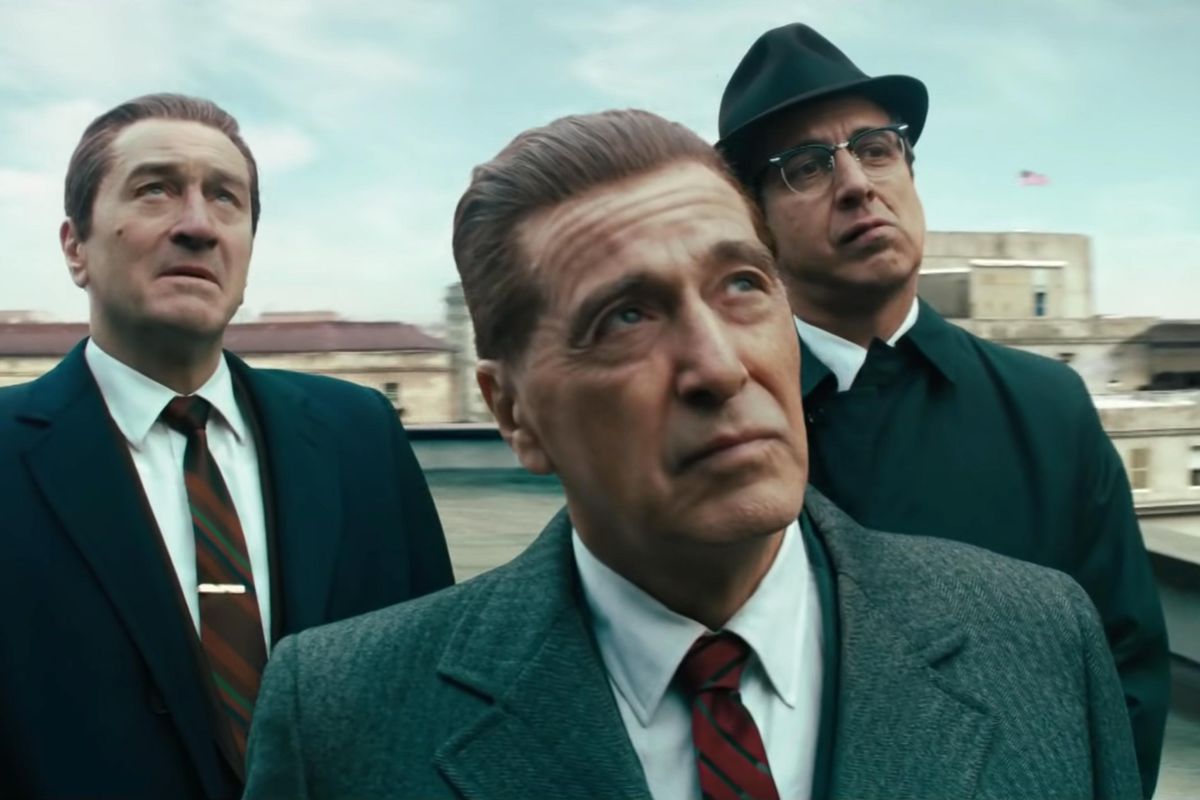Martin Scorsese / 2019 / USA / 209 minutes
Martin Scorsese’s new film, The Irishman, which closed this year’s BFI London Film Festival, is a time machine. Every movie concerned with the past, with reproducing and representing it, is a time machine too; but The Irishman seems unique for the number of years which elapse during it, the techniques used to do so, and for the way the film’s compression accentuates the impairments of age, creating a tone mournful and at times severe. With his recent Silence, and now with The Irishman, Scorsese is at his most contemplative: in Silence, the contemplation focused on the potential absence of God; in The Irishman, it’s the question of what to do with the time afforded you, before it expires.
Adapted from Charles Brandt’s book I Heard You Paint Houses, The Irishman is the story of Frank Sheeran (Robert De Niro), a truck driver who rises, thanks to a skill for loyalty and keeping the right friends happy, to the position of president of a local Teamsters Union. The first lasting friendship he makes is with Russell Bufalino (Joe Pesci), head of the crime family. As Frank works his way up ‘painting houses’ (carrying out hits and dirty tasks, quietly and consistently), Russell gives him a job as a right-hand man to union boss Jimmy Hoffa (Al Pacino). What’s central to the film is how Sheeran navigates between these two figures: he loves both, but the shifting allegiances and quick alterations of circumstance in the Philadelphia mob scene means his devotion to them will cause him no end of consternation.
When the film opens, Sheeran is in a nursing home, remembering and organising his thoughts on the matter of his past. The film unfurls out of this narration, pausing to magnify and emboss certain memories, on occasion folding into itself further. In one moment, a brief remembrance of Sheeran’s days in Italy during the Second World War, the film is technically a flashback within a flashback within a flashback within a flashback. And yet, because of the film’s exceptionally intuitive narrative and the expansive duration it allows itself to situate these temporal diversions, it does not feel cumbersome or over-burdened. It brings to mind Søren Kierkegaard’s dictum: ‘Life can only be understood backwards; but it must be lived forwards.’ The Irishman is an excavation of Sheeran’s past and an attempt to understand it.
The film’s dealings with time are perplexed by the technology used to de-age its cast (the three leading men all being in their seventies). At first, this is worrisome: when we spy Sheeran as a young man for the first time, he appears to have wandered into the film straight from the post-production suite of Welcome to Marwen. When the gap between the characters’ ages and the actors’ ages closes, the work is more refined and, especially in Pacino’s case, at times quite astonishing.
But the digital trickery, even at its most abrasively artificial, cannot draw attention away from performances this distinguished. De Niro hasn’t been better in years: the actor plays Sheeran with tight-lipped and obedient reserve, as someone efficient at completing jobs and winning confidences. As events tighten around him, watching De Niro produce such precise notes of pain and regret is not only a technical delight but a moving experience also. Pesci as Bufalino is a different beast to his antic, mercurial bad boys in Goodfellas and Casino. Here, he’s a gracious and calculated leader, but his coded remarks always imply that force can be exercised if it’s needed. Anna Paquin, Stephen Graham, and Harvey Keitel all do brilliant work in slightly curtailed roles, but the star of the show, and the source of The Irishman’s greatest pleasures, is Al Pacino. It’s a ripping performance which embeds him centrally into the texture and rhythm of the film; his rants provide the joyous paroxysms of Pacino ham acting at its most unencumbered, while his quiet moments of deliberation attain an affecting distinction. But most importantly, no one wrings the juice out of a line reading like Pacino.
The film marks some of the best work of editor Thelma Schoonmaker’s career: the extreme elegance and clarity of her editing ensures the film’s movements all build together to form a profound emotional coherence. The cinematography, by Rodrigo Prieto, has its stylish moments, its Scorsese curlicues: slow-motion montages backed with song cues, increasing the distance between subject and camera at the right second, selecting a close-up which best expresses a scene’s salient mood. But most of all The Irishman is impressive for its gracefulness: tight schemes of shot-reverse-shot, finely judged dollies, and a thrilling, swooping crane-shot into a courtroom which screams of classical Hollywood. The assurance of its touch is unmistakable.
Scorsese’s gangster narratives have always had a documentary aspect to them: in Goodfellas and Casino, the voice-overs relate their stories to you as if the speakers were watching and commenting on the films themselves. The Irishman adds a new feature in this regard with the freeze-frames on auxiliary characters: their names appear on screen, and just below them a text emerges which explains how, when, and in what manner of severity they died. Sure, there’s a dark humour in these captions, but in a film obsessed with the act of time passing, fixated on charting the course of the years, these death marches mean much more than they at first seem to. More than the film’s examinations of remorse, more than the damage a kind of stoical masculinity can cause, more than the politics of conscience, more than any of its various concerns, The Irishman is a film haunted by time’s inexorable roll towards death.
The Irishman will be released in selected UK cinemas from mid-November, and will be available to stream on Netflix from Nov 27th.
